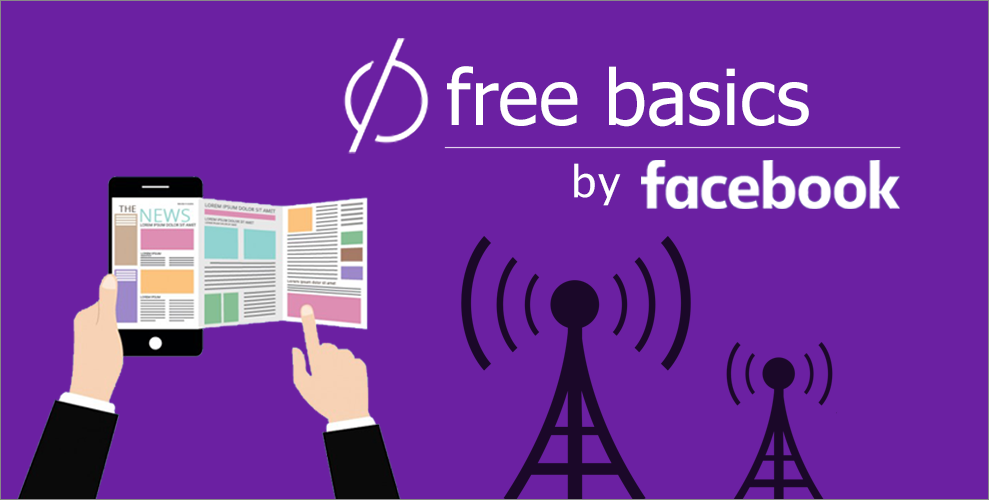“The Internet is essential to growing the knowledge we have and sharing it with each other. And for many of us, it’s a huge part of our everyday lives. But most of the world does not have access to the Internet.â€
All of the above is true and is excerpted from Internet.org’s mission statement, which continues as follows:
“Internet.org is a Facebook-led initiative with the goal of bringing Internet access and the benefits of connectivity to the portion of the world that doesn‘t have them.â€
It’s hard to argue with that mission. In fact, it’s a worthy goal. However, Facebook’s Free Basics Internet, which is part of this initiative, has some serious flaws. India rejected Free Basics for its own reasons, and many are calling for Africa to do the same for a completely different set of reasons.
What is Free Basics?
According to Internet.org, Free Basics by Facebook provides mobile access to useful services (such as news, health, education, employment, and local information) in markets where Internet access might not be affordable. Access to Free Basics websites is free, and there are no data charges.
As an open platform, developers can add a website — as long as it meets Free Basics’ participation and technical guidelines. In order to be listed in Free Basics, a website must meet certain compatibility, efficiency, and technical specifications. Sites must be proxied for inclusion in Free Basics, comply with local laws and regulations, be optimized for use on mobile devices with limited bandwidth, and more. In addition, some types of websites, such as secure websites, and technologies, such as Flash or Java applets, are not supported.
Why Might Free Basics Be Bad for Africa?
When you first hear about Free Basics, it sounds good because free Internet access could make a huge difference in improving the lives of Africans. However, that’s not what Free Basics is.
Free Basics is a platform with a limited set of websites. It is open in that you or I could potentially develop a website that meets Free Basics’ guidelines and ultimately get it listed if we follow the rules. But it’s not open the way we normally think of the Internet where anyone could create and publish a website that others can access via a standard web browser.
An article on ForeignPolicy.com, titled “Facebook’s Free Basics is an African Dictator’s Dream,†puts it like this:
The app is essentially a cheap version of the Internet, a fact that by itself implies that some people aren’t good enough to merit the whole thing. Even worse, it’s a version of the Internet that gives Facebook — and by extension the corporations and governments that partner with Facebook — total control over what its users can access.
On a continent where government and corporate corruption and malfeasance are the order of the day, a two-tiered Internet could serve up significantly different information. For example, someone with full Internet access might search for information about an organization and find a wealth of information — both positive and negative — whereas someone with limited access via a service like Free Basics might only discover the organization’s own site — paid for and controlled by itself and loaded with glowing reports.
Likewise, state-control or partial control over the media and mobile carriers raises even more red flags for Africa. With a platform such as Free Basics, mobile partners under government control may be pressured to restrict access or hand over user data. Meanwhile, Facebook itself has its own standards and agenda and could — and has — shut down sites for reasons of its own.
In a post-Arab Spring era, it’s not unheard of for African governments to cut off access to the Internet in order to curtail protests. According to an article by the New York Times, this happened recently in Cameroon, Gambia, Gabon, Democratic Republic of Congo, and Ethiopia. In addition, government officials in Zimbabwe raised prices on cellular data after protests in what many believe was an attempt to curb the use of social media.
The Foreign Policy article explains the thinking behind this trend:
“These states shut down the Internet because they fear they cannot control it. Free Basics gives them a version of the Internet that they can influence, if not totally control.â€
Another concern involves activists and agitators whose voices are mostly heard via non-traditional channels with less government interference — such as the Internet. Their voices are likely to be muted on Free Basics, and this is where the people who need to hear their messages would likely be.
First, they don’t fit Internet.org’s definition of “useful services†like news, health, education, employment, and local information. Second, they would need to focus time, resources, and technical expertise to develop and submit proxy sites compatible with Free Basics. Third, they may have concerns about the privacy of their personal information.
Meanwhile, Africa needs to invest in its information technology infrastructure. Free Basics could give governments a reason to skimp on these investments. After all, if the population is getting free services from Facebook, why would they need to build their own public IT infrastructure?
Even if Free Basics didn’t raise the concerns discussed here, Facebook is a private entity. Do we really want to put a public telecommunications service in a private company like Facebook’s hands?
As generous as providing free access to useful services may appear to be, the consequences of Free Basics in Africa could prove to be costly.



